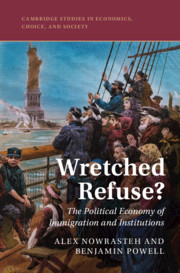Book contents
- Wretched Refuse?
- Cambridge Studies in Economics, Choice, and Society
- Wretched Refuse?
- Copyright page
- Contents
- Tables
- Figures
- Acknowledgments
- 1 Introduction
- Part I State of the Debate
- Part II Cross-country Evidence
- Part III Case Studies in Mass Immigration
- Part IV Assessing the New Economic Case for Immigration Restrictions
- Bibliography
- Index
1 - Introduction
Published online by Cambridge University Press: 10 December 2020
- Wretched Refuse?
- Cambridge Studies in Economics, Choice, and Society
- Wretched Refuse?
- Copyright page
- Contents
- Tables
- Figures
- Acknowledgments
- 1 Introduction
- Part I State of the Debate
- Part II Cross-country Evidence
- Part III Case Studies in Mass Immigration
- Part IV Assessing the New Economic Case for Immigration Restrictions
- Bibliography
- Index
Summary
Virtually every government currently places restrictions, and often severe restrictions, limiting the numbers and types of foreign-born people allowed into their countries to live and work. Yet hundreds of millions of people, often in poorer countries, desire to emigrate to other countries and engage in economic exchanges with people already residing there.1 There are large numbers of natives in these would-be destination countries who would also engage in economic exchanges by employing, renting to, and purchasing goods and services from these would-be immigrants. A central tenet of economics is that voluntary exchange is expected to be mutually beneficial. When governments use their coercive powers to prevent voluntary exchanges, they make people who would have otherwise made an exchange worse off and, as long as there were no large externalities that would have impacted third parties, make the world poorer as a result. Immigration restrictions that prevent exchanges between would-be immigrants and people residing in destination countries are likely the largest policy-induced economic distortion in our global economy.
- Type
- Chapter
- Information
- Wretched Refuse?The Political Economy of Immigration and Institutions, pp. 1 - 6Publisher: Cambridge University PressPrint publication year: 2020

